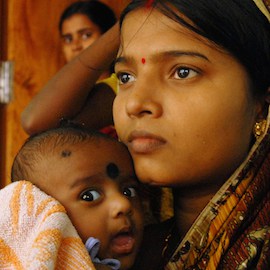Leveraging the COVID-19 Crisis for Local Development: How the Pandemic Can Strengthen Public-Private Collaboration in Africa
There is no doubt that the COVID-19 pandemic is a humanitarian crisis. But it could also be an opportunity for the African continent. If we build the right public-private partnerships and improve collaboration across industries and sectors, I’m confident we can create better outcomes for our citizens. Previous crises have shown how vulnerable our African economies are to external shocks, and the current pandemic continues to prove this. Yet we have at our disposal the means to create sustainable change—if we work smarter and build up our digital economy.
Throughout the pandemic, two of the biggest challenges we’ve faced (both in my country Guinea, and across Africa) have been eased by collaborations between the private and public sectors: getting food on people’s tables as international supply chains broke down, and slowing the spread of the virus by sharing information.
The Need for Locally Grown Food
In Guinea, as borders closed and movement restrictions came into force in the early stages of the pandemic, we needed to ensure that people were fed. Yet despite growing our own high-quality produce, subsidies for imported products make locally grown food more expensive than lower-quality products brought in from abroad. Such a contradiction cannot continue at a time when we should be reducing our vulnerabilities by becoming self-sustaining and self-reliant. We can’t ignore the potential for positive environmental impact in locally sourced food as well. By reducing the distance our food is transported, we can contribute to cutting CO2 emissions—an important goal for Africa, when research shows that we’re being disproportionally impacted by climate change.
When the fragility of international supply chains became apparent and imported food became more difficult to access, it was our local farmers who were on hand to meet the need for locally produced food. To support their efforts, I used my network as former Finance Minister to initiate a campaign promoting the purchase of locally grown and processed food. This caused a boost in the production of locally grown rice—recognized as a superior, nutrient-rich rice—from 10 to 25 tons. Not only did this ensure that our citizens had access to food, we were able to support over 10,000 farmers – more than half of whom were from women’s farmers’ associations. This support was particularly necessary in light of the increased impact of the COVID-19 pandemic on women, giving them the financial support they needed to feed their own families during this crisis.
Sharing Information During the Crisis
One of the biggest hurdles to overcome during this pandemic—in fact during any crisis—is giving people access to the right information. For the current crisis, that means information on how to prevent the spread of the virus, as well as accurate reporting on infection and mortality figures. In the early stages of the pandemic, I provided funding and networking connections for a group of young tech developers, to support their efforts to create the public-private partnerships they needed to get funding and hosting for an app offering improved contact tracing. By making regional connections, we were able to keep their local expertise local, rather than outsourcing the idea to international developers. Other local tech developers in Guinea also created online marketplace solutions in response to the pandemic, bringing together producers and consumers of local products. When physical sales, both local and exports, couldn’t be completed, this solution filled the gap. It was a great example of how innovation can arise from new needs generated by specific contexts.
These examples—projects to support local farmers and local tech developers—might seem unconnected at first glance. But what both groups share is a deep understanding of the local context and the specific needs emerging from that environment. It is this understanding that helps them to create context-specific solutions for local communities and challenges, creating ecosystems that simply weren’t there before.
As I’ve worked with private and public sector actors in Guinea to develop these solutions, I’ve been able to tap into a network of women from across the continent who are implementing other innovative approaches to tackling the pandemic in their countries. Through the Amujae Initiative, the flagship program of the Ellen Johnson Sirleaf Presidential Center for Women and Development, I’ve sourced inspiration, shared ideas and brainstormed solutions to seemingly intractable problems. These kinds of networks, which are sourcing ideas from within the continent rather than always looking outside, are critical to tackling the challenges we collectively face.
Key actions for governments, the international private sector and development partners
Turning this tragedy into an opportunity to boost local economic development and innovation will require governments to take the lead, mobilizing international private sector actors and development partners to provide support for locally driven solutions.
For governments, this means developing public procurement policies that benefit the local economy. Let’s make sure that large, state consumers, like our military, are purchasing locally sourced and processed foods, helping us to formalize more of our agricultural economy and allowing farmers to achieve scale in their production.
Where subsidies are available, they should be shifted to apply to our own produce. Why are we subsidizing imports of lower-quality products, thereby making our local produce uncompetitive and costly for our populations? Supply chain shocks are expected to become more frequent due to COVID-19, so let’s shorten the chains and get better visibility into our sourcing strategies. And let’s communicate better about the quality of our local produce. If we don’t have government-backed communication strategies, our local consumers simply won’t know about the high-quality local products available and will continue to purchase imports.
Around the world—for both economic and environmental reasons—societies are demanding local products and bringing production closer to home. We should do the same, encouraging collaboration between the government and local producers who understand the context and specific requirements of our people. But these links will only be made with sufficient funding—the World Bank recently identified a $700 billion funding gap for small and medium enterprises (SMEs) in Africa.
The private sector must take action too. They have a role to play in helping to fill that funding gap, as well as providing the skills, expertise and networks that African entrepreneurs and SMEs need. They can help facilitate connections between local and international companies, providing new opportunities for collaboration and the cross-pollination of ideas and innovations that no longer need to be limited by location. Think of it like rap music—new artists sampling classic beats or portions of songs and turning them into something fresh and new.
The private sector can also help open up new ways for local innovators to seek investment. For instance, we’re seeing a real surge in crowdfunding, which can create a direct relationship between those who need funding, and those in a position to offer it. By cutting transaction costs and time, this approach can help ideas get to market faster.
Africa very much needs the help of international development partners in sharing best practices and supporting our government institutions in building our capacity and expertise. But we need those interventions to work for both us and them. Investments must be more nimble and agile, and more aligned with countries’ development agendas. For instance, let’s look seriously at blended finance options that bring together debt, equity and grants in the form of impact funding, to ensure we get investment that works and is in alignment with the UN Sustainable Development Goals and our African Agenda 2063.
It goes without saying that the COVID-19 pandemic is a tragedy. But it has already provided a significant opportunity to improve partnerships between the public and private sectors that can ultimately lead to more robust, thriving and innovative local economies. We must not lose the progress we have made so far. As we emerge from the pandemic, let’s make a concerted effort to continue the collaboration that we have started, and to build back better for Africa.
Malado Kaba served as the first female Economy and Finance Minister of the Republic of Guinea.
Photo courtesy of World Bank Photo Collection.
- Categories
- Agriculture, Coronavirus, Investing



